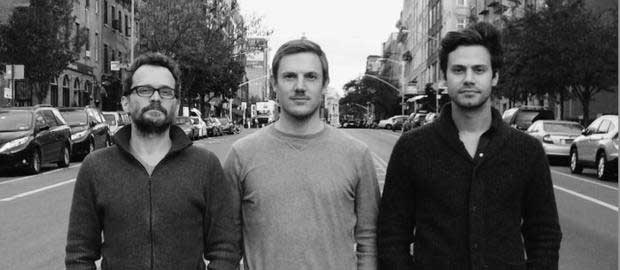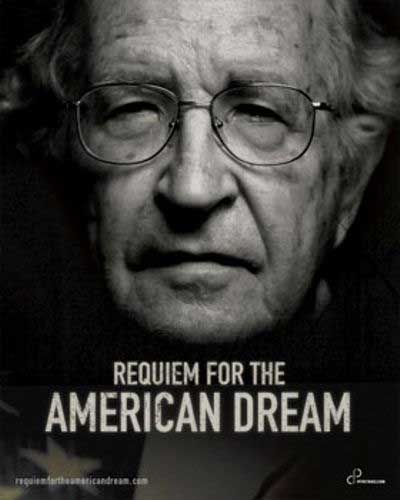Documentary filmmaker Peter Hutchison discusses Requiem For The American Dream, his new Noam Chomsky project that he co-directed and co-produced with fellow filmmakers Kelly Nyks and Jared Scott. The film centers around a candid discussion with the legendary MIT professor emeritus Noam Chomsky about the concentration of wealth and power in the hands of a few elites and the consequences for an American democracy.
Peter Hutchison is the founder of Birdland Films. His previous film projects include What Would Jesus Buy?, Split: A Divided America, and Awake Zion. He has also produced Swing Things, Bigger Than Jesus, and Drowning. Peter was kind enough to answer a few of my questions about the film and his thoughts on where we’re heading as a society overwhelmingly shaped and defined by Wall Street interests.
THE Noam Chomsky Documentary INTERVIEW
Craig Boehman: Is the film finished?
The film is in post. We’ve completed the interviews, an extensive series conducted with Noam over the course of the past year and half, and have 95% of the supporting material (b-roll from across the US, original artwork, info-graphics, rare archival material, the soundtrack, etc.) in the can as well. Our Kickstarter campaign is to raise finishing funds for costly post expenses so we can get the film out there and in front of people.
What was the genesis of Requiem For The American Dream?
Noam has had a great personal impact on all three of us, and this crossroads we’ve arrived at as a nation – with unprecedented inequality, a dwindling middle-class, the increasing concentration of power into the hands of the few, evisceration of Labor Unions, and the cumulative corrosive effect of all of this upon democracy – is something Chomsky has been writing and cautioning against for decades now. There’s truly no better person to tell the story of how we’ve arrived here, a story we believe desperately needs to be told.
The three of you are producing in addition to co-directing. How are the duties divided among you in the directing department?

Documentary filmmaking is a fluid and collaborative creative process. We each have our own personal strengths that we bring to the table and operate under the belief that the end result will be stronger with the collective input. Besides, there’s an overwhelming amount of work to be done, on so many levels; it helps to have engaged and invested partners in the process.
At the end of the day our collective goal is to present Chomsky’s work in a way that will resonate with a broader audience. So the challenge is to thoughtfully support his dialogue, not overshadow it, something we’ve taken a tremendous amount of care discussing with one another and carrying out.
What was it like meeting Noam Chomsky for the first time?
Honestly, it was a little intimidating at first. After all, it is Noam Chomsky. But you come to learn that’s all a function of what you bring with you and project onto him. Truth is, he’s an incredibly warm, funny and generous man. We’re extremely grateful for the time we were able to spend with him, and enjoyed every minute of it.
You all have explored similar themes in your past documentary projects. Did Noam open your eyes to anything you hadn’t known during your discussions with him?
Constantly. What I value most about Noam is that he continually challenges your thinking. Just when you’re convinced you’ve got a handle on things, he opens the door on an arcane chapter of American history in a way that illuminates your understanding of what’s going on today – both shifting and enriching your perspective. Don’t expect a simple answer from him. You won’t get it. He’s an ever-present reminder that reducing discourse to a series of sound bites imperils our understanding of the world around us.
On your website you make the connection between the concentration of wealth in the hands of a few and what this could spell out for many of us: “Requiem for the American Dream is the startling tale of what may prove to be the lasting legacy of our time – the death of the American middle class.” How close are we to witnessing the demise of the middle class?
If the current trend doesn’t change – and that will take some real engagement – the American middle class will most certainly continue to atrophy.
It’s a simple equation, actually. Wealth and power continues to consolidate in the hands of the few, who ultimately make the rules. Not surprisingly, those rules have shifted the past few decades to further benefit wealthy and corporate interests – through the deregulation of controls on corporate behavior; rewriting the tax code to shift the financial burdens of society from corporations and the wealthy onto the middle class and poor; trade agreements that allow for the easy outsourcing of jobs that puts workers into direct competition with one another globally; facilitating government bailouts that rob from the poor, enrich the wealthy, and only serve to encourage irresponsible behavior. The list goes on and on.
Add to this the orchestrated destruction of labor unions, in a very real sense, the last large-scale organized defender of middle and working class interests against corporate power, and you’ve got a middle class on the ropes. I hate to sound so grim, but that’s the reality.
When and where would you like to have opening night?
We’ll have to make that call when the film is ready, tentatively in May. But what we’re ultimately looking forward to is this film being shown in classrooms and communities, where we feel it could make the most significant impact.
Anything you’d like to add?
I’d like to express our gratitude to all those who have supported our film in the opening days of our Kickstarter campaign. Money for a project like this doesn’t come from traditional funding sources – it comes from the people who value the message enough to make it a reality. Requiem is truly an independent effort. We deeply appreciate this fact, and all those helping us to get Noam’s work out to as broad of an audience as possible.
Read more: https://www.digitaljournal.com/article/362140

Leave a Reply